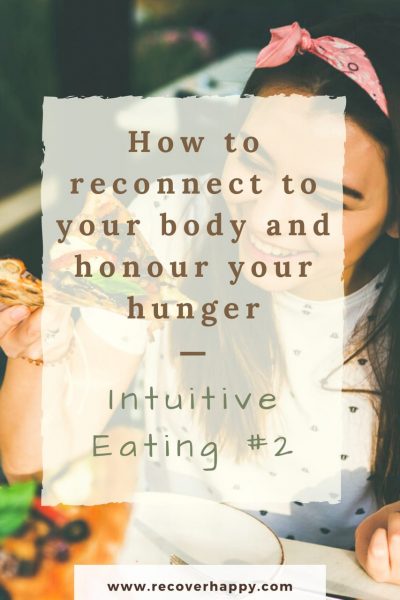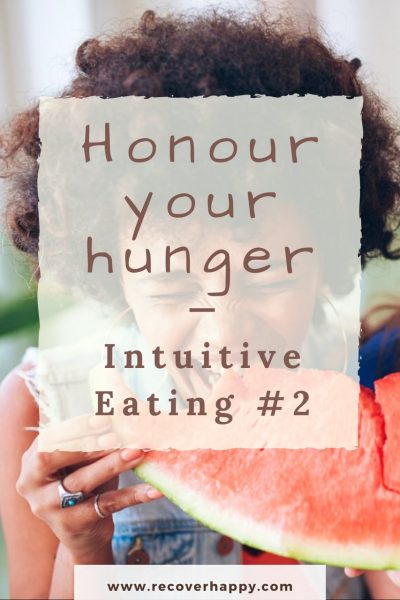How can you honour your hunger
By Tanja, Psychologist for Eating Disorders & Body Image

According to the founders of Intuitive Eating, “Hunger is a normal biological cue that lets you know that your body needs sustenance. Nourishing your body is as essential to life as is breathing. Honoring your hunger is an important part of Intuitive Eating.”

Hi there!
I’m Tanja. I’m a qualified psychologist specialising in eating disorders, negative body image and body hate. I’m also a survivor of anorexia.
My mission is to help you to end your lifelong struggles with food and your body and inspire you to uncover and embrace you true worth. Read more…
But what if you have forgotten what hunger feels like? What if you don’t know what your body wants? How can you honour your hunger when you see hunger as the enemy you have to fight, ignore or trick? Sadly, so many people have forgotten to listen to and interpret their body’s hunger and fullness cues. Don’t blame yourself or feel ashamed if this is you.
Indeed, we were all intuitive eaters when we were children. We ate when our body told us to and stopped when our body gave us the signal that it was full. We didn’t think about calories or worry about the size of portions. We didn’t feel any fear about food. But as we grew up, we fell victim to the diet culture, which taught us to ignore, distrust and control our hunger. If we ignore our hunger cues for too long, they often disappear altogether. Or you may end up “hearing” hunger cues only when you have reached a starved state, leaving you feeling out of control around food.
If you want to know how you can ban diets in your life read my blog article, Reject the diet mentality in 5 steps – Intuitive Eating Principle 1 or if you want to learn more about the risks and the harm of diets read my blog article Why are diets so bad for your mind and body.
The great thing is that you can reconnect with your hunger and fullness cues at any time. By learning to honour your hunger, you can heal your relationship with food. You can learn to trust your body again and to trust it around food.
Join the Body Acceptance & Food Freedom Collective
Receive a weekly dose of inspirations to help you make peace with your body and food.
Don’t worry, we hate spam too. You can unsubscribe any time.
Categories
Anorexia
Binge Eating Disorder
Bulimia
Intuitive Eating
Mindfulness
Orthorexia
Strategies for Recovery
What is hunger and what happens if you don’t follow your hunger cues
The term hunger refers to the biological need to eat. It is a sign from your body that it needs to be fed. If we engage in chronic dieting, we prevent ourselves from following our biological hunger, which causes primal hunger. Primal hunger is an urgent and intense craving to eat, which often results in overeating or bingeing. This is a natural compensation by our body in the event of starvation. Even though dieting might not look like starvation from the outside, chronic deprivation is a nutritionally traumatic attack on your body and mind that needs to be eliminated by continuous feeding. For your body, every meal you eat feels like the last.
Read the Minnesota Starvation Experiment study to learn more about how primal hunger can lead to eating disorders, food obsession and negative effects on mood.

How does hunger feel?
Before you can truly honour your hunger, you need to learn to listen to your body and know what hunger feels like. You may already know and recognise ravenous hunger, but there are also more nuanced and gentler feelings of hunger. Hunger can be experienced in different ways, in different parts of your body and to various degrees. It can feel different from person to person. In general, hunger is a rather uncomfortable experience, but if you are just a little hungry it can also be pleasant. Here are some examples of hunger sensations:
– Feeling of faintness
– Stomach pain
– A growling, gurgling, rumbly or empty stomach
– Irritably
– Fatigue, weakness, dullness or apathy
– Difficulty concentrating, headache or cloudy thinking
– Thoughts about food
If it is difficult to find out what hunger feels like for you, think of a time when you were hungry and you smelled a delicious meal. How did you feel? What was your bodily sensation? Where in your body did you feel this sensation?
What does it mean to honour your hunger?
When you honour your hunger it means that you not only take notice when you are hungry, but also you are attentive when your are satisfied and have eaten a proper portion of food. So when you honour your hunger it can look like this:
- Eat when you are hungry and stop when your satisfied.
- Eat only foods that you like and enjoy them because of their taste and texture rather than their health benefits.
- Don’t eat when you feel full or not hungry. Even if it is meal time, you don’t have to eat; wait until your body tells you that it is ready to be fed.
- Take care of yourself in different ways, for example by spending time with friends and family, writing a journal, going on holiday or wearing clothes that you like and feel comfortable in.

How can you start to honour your hunger?
Honour your hunger by becoming aware of your body’s cues. This means tuning into yourself and raising awareness of your physical hunger and satiety (fullness) cues. You also need to be conscious of your bodily states such as heartbeat and bladder fullness and physical responses to your emotions, such as a racing heart or sweating when you feel panic. By tuning into these sensations, you gain insight into your physiological and psychological states, which can help you figure out what you need to meet your needs. You could start by trying to sense your heart beat and count your heart rate without feeling your pulse. This will help you to start listening and reconnecting with your body’s sensations.
In the next step try to identify your hunger cues. These could be feelings, as mentioned above, or something completely different. Keep in mind that there is no wrong or right way to experience hunger. It could be a bit difficult at first and maybe even frustrating, especially if you haven’t felt hungry for a very long time. However, the more you listen to your body, the easier it will be to recognise the cues of hunger. An easy way to start is to use a rating scale from 0 to 10 to evaluate your hunger several times throughout the day (0 means painfully hungry and 10 means painfully full). Using the hunger discovery scale will also help you to monitor your hunger rating, the degree of your hunger and the food you have eaten.
Finally, create a self-care nutrition plan for times when your hunger cues are absent or you have a low desire to eat. This plan will ensure that in an emergency situation, you will still be feeding your body with food that you may enjoy or at least tolerate. Focus on meals and snacks that are easy to prepare and try to be flexible and open to adjustments.
It will take time to honour your hunger; for some, it can take just a few days to recognise and respond to hunger cues. For others, it can take weeks or months. The important thing is to be patient and kind to yourself and to continue to make progress.
You don’t need to struggle alone on your recovery journey.
Simply get in touch to discuss how I can help you.
It is entirely possible to overcome an eating disorder or body hate –
I have done it, others have done it and so can you!
Join the Body Acceptance & Food Freedom Collective
Receive a weekly dose of inspirations to help you make peace with your body and food.
Don’t worry, we hate spam too. You can unsubscribe any time.
You Might Also Enjoy...

Hi there!
I’m Tanja. I’m a qualified psychologist specialising in eating disorders, negative body image and body hate. I’m also a survivor of anorexia.
My mission is to help you to end your lifelong struggles with food and your body and inspire you to uncover and embrace you true worth. Read more…



